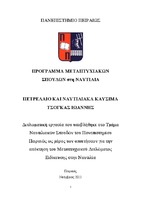Πετρέλαιο και ναυτιλιακά καύσιμα

Προβολή/
Θεματική επικεφαλίδα
Πετρέλαιο ως καύσιμη ύλη ; Πλοία -- Καύσιμα ; Petroleum as fuel ; Ships -- Fuel ; Ships -- Fuel -- Environmental aspects ; Ships -- Cost of operationΠερίληψη
Το πετρέλαιο είναι ένα υγρό καύσιμο, που έχει κατά την εποχή μας τη μεγαλύτερη διάδοση απ' όλα τα ορυκτά καύσιμα και είναι η σπουδαιότερη πηγή ενέργειας. Στην καθημερινή μας ζωή το πετρέλαιο εκτός όλων των υπολοίπων χρήσεων του, τροφοδοτεί εκατομμύρια κινητήρες εσωτερικής καύσης, που κινούν κυρίως τα μέσα συγκοινωνίας στην ξηρά, στον αέρα και στη θάλασσα. Έχει χρώμα καστανό ή σταχτοκίτρινο ή κάποτε και μελανό, ιδιάζουσα οσμή και ειδικό βάρος 0,85-0,86 κατά μέσο όρο, γιατί υπάρχουν πολλά είδη πετρελαίου, ανάλογα με τον τόπο εξαγωγής τους. Τα καύσιμα ναυτιλίας (marine fuel oil) ακόμα και σήμερα βασίζονται στα υπολείμματα απόσταξης του αργού πετρελαίου, τα οποία έχουν τη χαμηλότερη τιμή πώλησης και παρουσιάζουν φθίνουσα ζήτηση με την πάροδο του χρόνου με τις προδιαγραφές της αγοράς να θέτουν περιορισμούς κυρίως στο ιξώδες και την περιεκτικότητα σε θείο. Η προμήθεια καυσίμων από τη ναυτιλία και η επιθυμητή τους ποιότητα συμπυκνώνεται στο πρότυπο ISO 8217, το οποίο παρέχει προδιαγραφές τόσο για τη σειρά των ενδιάμεσων, υπολειμματικών καυσίμων (IFO series) όσο και για τα καύσιμα προϊόντα διύλισης αργού πετρελαίου (distillate marine fuels). Με δεδομένο ότι η κατανάλωση καυσίμων στις κύριες και βοηθητικές μηχανές αποτελούν περίπου το 50-60% του κόστους λειτουργίας ενός σύγχρονου πλοίου, έχουν καταβληθεί σημαντικές προσπάθειες για τον περιορισμό του κόστους αυτού μέσω της βελτιστοποίησης της γεωμετρίας της γάστρας και της υπερκατασκευής με στόχο τη μειωμένη αντίσταση πρόωσης, τη συνεργασία σκάφους-έλικας, τη διατήρηση καθαρών υφάλων με χρήση εξειδικευμένων, πολυμερών χρωμάτων, τη βελτίωση των μηχανών πρόωσης με μείωση της ειδικής κατανάλωσης καυσίμου, κ.α. Τα ναυτιλιακά καύσιμα σύμφωνα με το σχετικό ISO 8217 διακρίνονται σε δύο κατηγορίες: πετρέλαιο diesel και μαζούτ.


